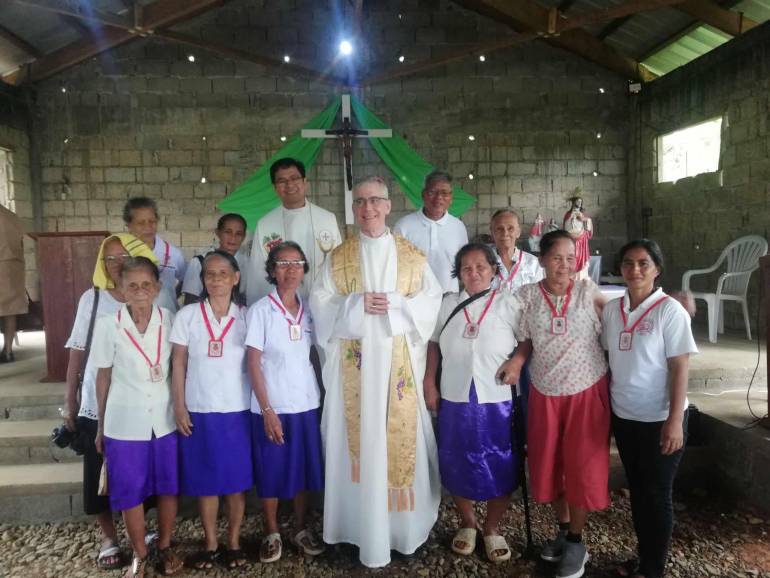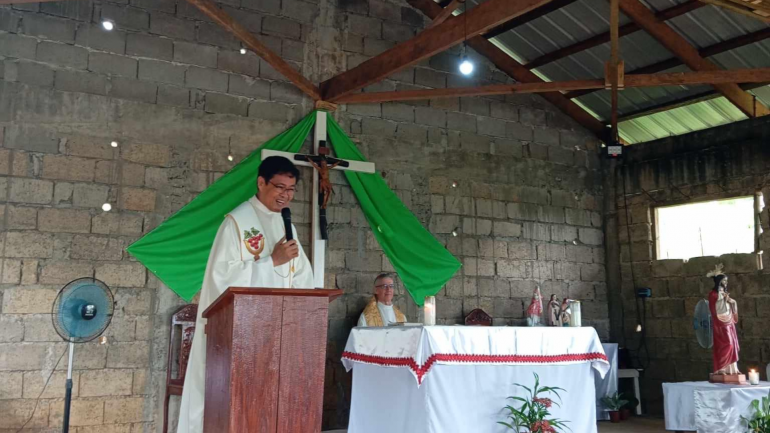A Historic First: Apostolic Nuncio celebrates English Mass in remote Palawan Chapel

"It was the first time an Apostolic Nuncio had come to Sitio Bual-Bualan, the remotest community in our parish," Father Eu Elivera
On June 7, the Apostolic Nuncio, Archbishop Charles John Brown, made history by presiding over the first English Mass at Sta. Cecilia Chapel in Sitio Bull-Bualan, a remote community within the Vicariate Apostolic of Puerto Princesa on Palawan Island.
This landmark event marked a series of firsts for the parish, bringing the universal message of faith and unity to one of the most isolated areas in the region.
Breaking New Ground: Archbishop Brown's Unforgettable Visit to Sitio Bull-Bualan
The Apostolic Nuncio, Archbishop Charles John Brown, presided over the first English mass at Sta. Cecilia Chapel of Sitio Bull-Bualan, a remote location in the Vicariate Apostolic of Puerto Princesa, on June 7.
Puerto Princesa is a coastal city on Palawan Island in the western Philippines.
“We have had many firsts. It was the first time that Saint Nicholas of Tolentino Parish had Mass in English," said Father Eu Elivera, parish priest. "It was the first time an Apostolic Nuncio had come to Sitio Bual-Bualan, the remotest community in our parish."
Preparing for this unique event presented its own challenges. Father Elivera admitted that initially, there was uncertainty about how to conduct the first English Mass in the chapel.
“Thankfully, the Nuncio made it all straightforward with his calming presence and profound simplicity,” Elivera noted.
Bishop Socrates Calamba Mesiona of the Vicariate Apostolic of Puerto Princesa had informed Elivera that the Nuncio would celebrate a private Mass while vacationing in Napsan.
Elivera tried to keep the visit confidential but eventually suggested to Bishop Mesiona that the Mass be held in a small village chapel instead of being private.
The bishop agreed, emphasizing the benefit of the Nuncio witnessing the actual situation of the remote community.
The chapel or parish had nothing for the English Mass—no liturgical books, and solemnity of the Most Sacred Heart.
Elivera made an effort to gather as much information as possible from everyone, but only the readings proved feasible. His friend had sent him a link for a misalette (Sambuhay) to download from the internet and print.
And for the Order of the Mass, he got them from an old prayer book, “Pandasal.”
There was nothing that was not acceptable to the Nuncio. At each instruction and explanation, the parish priest relayed to him that I had observed him nodding and telling me, “Okay… good.”
"Nuncio has left us with an imprint that could live up to timelessness. Engraved now in our memory is a humble messenger of God’s love and hope to people,” said Elivera.
Unity in Simplicity: A Community's Profound Experience with the Apostolic Nuncio
The celebration went so well. It was rather solemn. Miraculously, the sound system and the microphone did cooperate at that very time. The choir was able to sing a little English and Latin (Dona nobis pacem).
"During the Mass, however, I observed how "different" my parishioners had become." Everybody was well-behaved and prim. This was rather unusual. I dare say that they were not normal at that time,” Elivera said.
I was amazed that a man of lofty status would come to a far lower village. Everyone was in awe, to say the least, and wondered about having the Papal Nuncio among them.
The fact that people were silent and staring at a blank wall could indicate a religious experience. It could be what the ancients would call “visitatio dei," the term used to describe the event when a bishop would visit a community.

After the mass, however, the nuncio was in high spirits, and it seemed that the people were also enjoying themselves. He had everybody taking selfies and photo ops.
"To be honest, I was already quite embarrassed that he was being mobbed," Elivera admitted. On the other hand, I noticed that my parishioners were ecstatic and overjoyed to have a high-ranking official with them and close to them,” said Elivera.
After the mass, people served “buko” (coconut) and “linupak” (a traditional Filipino delicacy made from mashed or pounded starchy foods mixed with coconut milk and sugar) to Nuncio.
“It could indeed just be firsts, but the Nuncio has left us with an imprint that could live up to timelessness. Engraved now in our memory is a humble messenger of God’s love and hope to people,” said Elivera.
“The image of a simple and friendly servant will no longer leave the hearts of my parishioners,” he added.
On a personal note, Elivera saw a genuine humanity that was truly reflective of a divinity that only comes from within. In its truest sense, humanity is not opposed to divinity, and it could also be vice versa. Therefore, any initial act could have lasting effects. As Elivera said, "First, _____ never dies."
“We thank Archbishop Brown for visiting us. We welcome him back again next time,” Elivera added.
Archbishop Brown's visit to Sitio Bull-Bualan left an indelible mark on the community. The first English Mass, celebrated with profound simplicity and heartfelt participation, highlighted the deep connection between divinity and humanity.
As parishioners reflected on the experience, Father Eu Elivera emphasized the lasting impact of the Nuncio's humble and approachable presence.
The event not only enriched the spiritual lives of the attendees but also strengthened the bonds of faith and community. The parish eagerly anticipates future visits, inspired by the Nuncio's message of God's love and hope.








